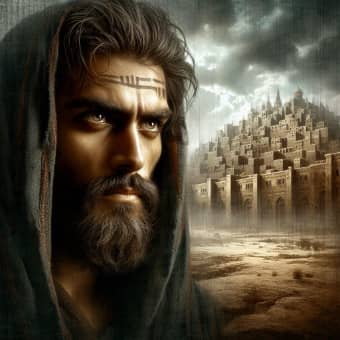Unveiling Barabbas
The Man Behind The Pardon
Barabbas is a character who appears fleetingly in the crucifixion narrative within the Christian gospels, nonetheless, his figure casts a long shadow over the events of Good Friday. To truly understand Barabbas, one must dive into the historical, cultural, and religious context of the time.
This blog post contains affiliate links. When you click on a link on this page and make a purchase I may earn a small commission, at no additional cost to you. Thank you for your support.
Who Was Barabbas?
Barabbas is mentioned in all four canonical gospels: Matthew, Mark, Luke, and John. His name means “son of the father” in Aramaic, which carries a certain level of irony since Jesus, who is considered by Christians as the Son of God the Father, was the one ultimately crucified in his stead.

The Pardon of Barabbas
The gospels present Barabbas as a prisoner chosen for release by the crowd over Jesus Christ. Pontius Pilate, the governor, found himself in the annual tradition of pardoning a prisoner at the feast of Passover. What’s intriguing about Barabbas is the nature of his crimes.
The gospels of Matthew and Mark describe him as a “notorious prisoner” and involved in a rebellion, while Luke states he was charged for insurrection and murder. John’s gospel simply calls him a robber.
The Historical Context
During the time of Jesus and Barabbas, Judea was under Roman occupation. The Romans often encountered resistance from the local population, and any kind of insurrection was met with brutal force. Barabbas, according to the gospel accounts, was involved in an uprising—a common occurrence as many Jews resisted Roman rule.
The Theological Perspective
For theologians, Barabbas’s release over Jesus is ripe with symbolism. In a way, Barabbas represents humanity’s sinful nature. Jesus, an innocent man, sacrificed himself so that Barabbas—a symbol of a guilty man—could be set free. This act has been interpreted as a metaphor for the salvation offered through Christ.
After the Pardon
The biblical account does not detail the life of Barabbas post-release; his fate is unknown. Various apocryphal writings and later Christian traditions have tried to fill in the gaps, some suggesting he might have been moved by the event of Jesus’ crucifixion and changed his ways, while others theorize he continued his rebellion against Rome until his death.
Reflecting on Barabbas Today
Barabbas’s story continues to provoke thought and discussion. From a historical perspective, it provides a glimpse into the political and social dynamics of the time. Theologically, Barabbas is seen as a mirror reflecting the grace and mercy offered to all, regardless of one’s past.
In sum, the account of Barabbas offers a complex intersection of history, faith, and social dynamics. His pardon, juxtaposed against the condemnation of Jesus, invites contemplation on themes of justice, mercy, and sacrifice that continue to resonate to this day.
Looking for unique Catholic gifts? Check out our gift guide!
If you found this content helpful, you can support Moody Catholic and keep this blog ad free by making a donation of any amount. Learn more by reading the – Support Our Blog page.
